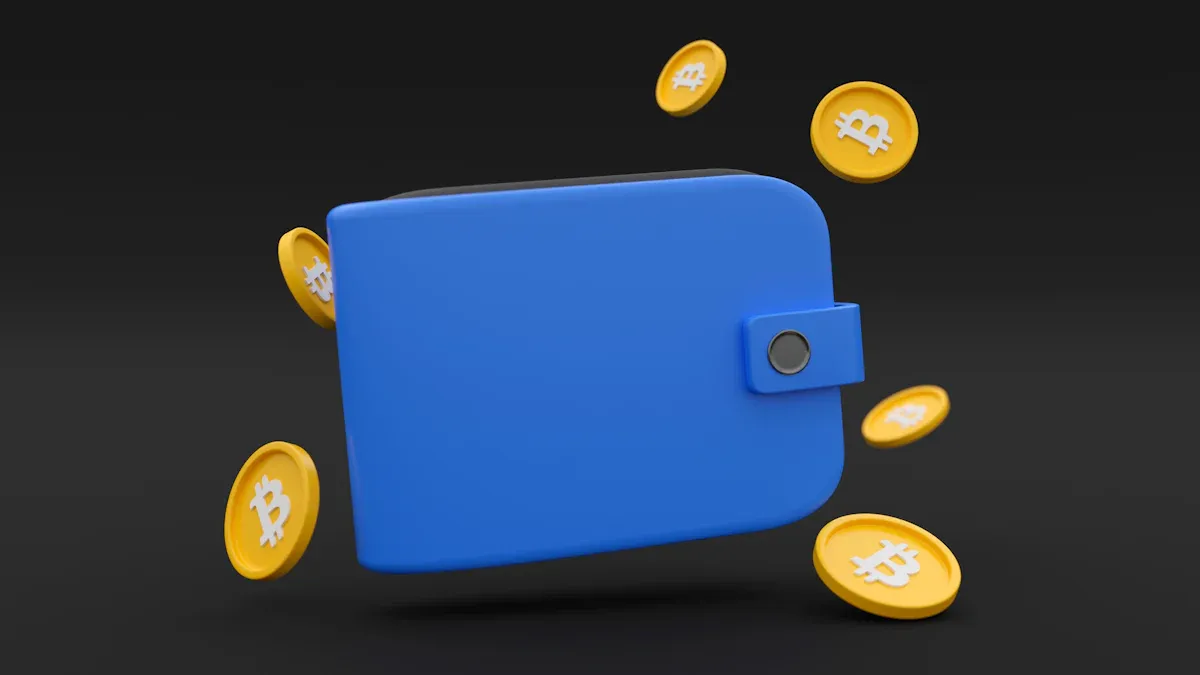What Is a Cold Wallet in Cryptocurrency and How Does It Work?
2025-07-08 00:00:00
A cold wallet in cryptocurrency, or what is a cold wallet in cryptocurrency, refers to an offline storage solution for safeguarding digital assets. It eliminates internet exposure, significantly reducing the risk of hacking. Cold storage is crucial for securing crypto holdings, especially as losses from cryptocurrency hacks surged by 21% in 2024, totaling $2.2 billion. Self-custody ensures users retain control over their digital assets, protecting them from unauthorized access.
Types of Cold Wallets

Cold wallets are essential cryptocurrency storage solutions that keep private keys offline, offering enhanced security against online threats. Among the various types of cold wallets, hardware wallets, paper wallets, and air-gapped devices stand out as the most popular options. Each has unique features, benefits, and limitations.
Hardware Wallets
Hardware wallets are physical devices designed specifically for storing private keys offline. These wallets are widely regarded as one of the most secure options for safeguarding crypto assets. They combine ease of use with advanced security features, making them a preferred choice for many users.
- Security Features:
Hardware wallets require physical confirmation for transactions, ensuring that unauthorized access is nearly impossible. They store private keys on secure chips, which remain offline, significantly reducing exposure to cyber threats. Transactions are signed internally, so private keys never leave the device. - Adoption Trends:
The adoption of hardware wallets surged following major market events like the FTX collapse. In November 2022, Google searches for "hardware wallet" peaked as users sought safer alternatives to exchange-based storage. This trend highlights the growing awareness of the importance of self-custody in crypto. - Examples:
Popular hardware wallets include Ledger Nano X, Trezor Model T, and SafePal S1. These devices are compact, portable, and compatible with various cryptocurrencies.
Tip: Always purchase hardware wallets directly from the manufacturer or authorized resellers to avoid tampered devices.
Paper Wallets
Paper wallets are a simple yet effective cold wallet device for storing private keys. They involve printing private keys and public addresses on paper, which can then be stored securely offline. While they offer immunity to digital attacks, they come with their own set of risks.
- Advantages:
Paper wallets are immune to hacking since they store private keys offline. They are cost-effective and do not require any specialized hardware or software. - Risks:
The primary risks associated with paper wallets include loss, theft, or physical damage. Users must generate paper wallets in a secure, offline environment and store them in a safe location, such as a fireproof safe. Making multiple copies and storing them in different locations can mitigate these risks. - Use Cases:
Paper wallets are ideal for long-term storage of crypto assets that do not require frequent transactions. However, they are less practical for active trading or regular use.
Note: Avoid sharing or exposing your paper wallet to others, as anyone with access to the private keys can control the funds.
Air-Gapped Devices
Air-gapped devices are specialized cold wallet devices that operate without any internet connectivity. These wallets are designed for maximum security, making them suitable for storing large amounts of cryptocurrency.
| Aspect | Details |
|---|---|
| Benefits | Air-gapped devices keep private keys offline, eliminating the risk of remote attacks. They are ideal for users with significant crypto holdings. |
| Limitations | These wallets require a complex setup and secure methods for transferring data. They are not beginner-friendly and can be time-consuming to use. |
| Convenience | Air-gapped devices prioritize security over convenience, making them best suited for advanced users. |
| Price | The cost of air-gapped devices ranges from $100 to $1,000, depending on the model and features. |
Air-gapped devices provide unparalleled security by ensuring that private keys remain isolated from any network. However, their complexity and cost may deter casual users. Examples include dedicated air-gapped laptops or devices like Coldcard.
Tip: Use air-gapped devices for long-term storage of large crypto holdings. For smaller amounts or frequent transactions, consider hardware wallets instead.
Advantages and Disadvantages of Cold Wallets
Benefits of Cold Storage for Crypto
Cold storage offers unparalleled protection for cryptocurrency assets by keeping private keys offline. This method significantly reduces the risk of hacking, phishing, and other online threats. Unlike hot wallets, which remain connected to the internet, cold wallets provide a secure environment for storing digital assets.
One of the primary advantages of cold storage is its ability to safeguard private keys from cyberattacks. Cold wallets often incorporate advanced security features, such as secure element chips and PIN protection, to ensure that unauthorized access is nearly impossible. Additionally, air-gapped functionality in some wallets prevents any interaction with online networks, further enhancing security. These features make cold wallets an ideal choice for long-term storage of crypto holdings.
| Performance Metric | Description |
|---|---|
| Reduced hacking risk | Cold storage keeps private keys offline, eliminating the risk of hacking. |
| Protecting investments | Adds extra security, ensuring peace of mind for valuable investments. |
| Long-term security | Protects against vulnerabilities in online exchanges or hot wallets over time. |
| Reduced phishing risk | Prevents falling victim to phishing scams targeting private keys online. |
| Scalability potential | Hardware wallets allow adding more devices as cryptocurrency holdings grow. |
Cold wallets also provide peace of mind for crypto investors. By storing private keys offline, users can protect their digital assets from vulnerabilities in online exchanges or hot wallets. This makes cold storage particularly suitable for individuals holding large amounts of cryptocurrency or those planning to store their assets for extended periods.
Tip: To maximize security, users should always back up their seed phrases and store them in a secure location, such as a fireproof safe.
Risks and Limitations of Cold Wallets
While cold wallets offer enhanced security, they are not without risks and limitations. One of the most significant challenges is the potential for physical theft, loss, or damage to the wallet. Unlike hot wallets, which can be accessed online, cold wallets rely entirely on the physical device or medium for access. Misplacing or forgetting the seed phrase can result in permanent loss of funds.
- Common risks associated with cold wallets include:
- Physical theft of the device.
- Loss or damage to the wallet.
- Misplacing or forgetting the seed phrase.
Another limitation of cold wallets is their lack of convenience for frequent transactions. Since these wallets are offline, users must connect them to a computer or compatible device to initiate transactions. This process can be time-consuming and less practical for individuals who engage in daily crypto trading. Additionally, the initial cost of purchasing a hardware wallet may deter some users, especially those with smaller crypto holdings.
| Feature | Cold Storage Wallets | Hot Wallets |
|---|---|---|
| Internet Connectivity | Offline (can integrate with hot wallets) | Always online |
| Security | Higher | Lower |
| Convenience | Less convenient for frequent transactions | More convenient for daily use |
| Cost | Hardware purchase required | Typically free |
| Best For | Long-term storage, large amounts of crypto | Daily transactions, smaller amounts of crypto |
Despite these limitations, cold wallets remain a preferred choice for users prioritizing security over convenience. They are particularly well-suited for long-term storage of digital assets, where the primary goal is to protect private keys from online threats.
Note: Users should evaluate their specific needs and risk tolerance before choosing a cold wallet. For smaller amounts or frequent transactions, a hot wallet may be more practical.
Cold Wallets vs. Hot Wallets

Security vs. Convenience
The debate between cold wallets and hot wallets often centers on the trade-off between security and convenience. Cold wallets prioritize security by keeping private keys offline, making them highly resistant to hacking and phishing attacks. In contrast, hot wallets remain connected to the internet, offering quick access but exposing private keys to potential cyber threats.
A comparison with hot wallets reveals key differences in their features:
| Feature | Hot Wallets | Cold Wallets |
|---|---|---|
| Connectivity | Always connected to the internet for quick access. | Offline storage enhances security. |
| Security | More vulnerable to hacking and phishing attacks. | Superior security by keeping private keys offline. |
| User Experience | User-friendly with intuitive interfaces. | May have a steeper learning curve. |
| Storage Capacity | Supports a wide range of cryptocurrencies. | May have limitations on types of cryptocurrencies. |
| Cost | Often free to use, generating revenue through fees. | Requires upfront investment for hardware wallets. |
Cold wallets excel in safeguarding crypto assets, especially for long-term storage. However, their offline nature makes them less convenient for frequent transactions. Hot wallets, on the other hand, provide ease of use but come with increased risks.
Tip: Users should weigh their priorities—security or convenience—before deciding on a wallet type.
Choosing Between Cold Storage and Hot Wallets
Selecting between cold storage and hot wallets depends on individual needs and risk tolerance. Cold wallets suit users who prioritize security and plan to store large amounts of crypto for extended periods. By keeping private keys offline, they offer unmatched protection against online threats.
Hot wallets, however, cater to users who require quick access to their funds. These wallets are ideal for smaller amounts of crypto or frequent transactions. Their user-friendly interfaces make them accessible even to beginners, though they carry higher risks due to constant internet connectivity.
For maximum security, many users adopt a hybrid approach. They store the majority of their crypto in a cold wallet while using a hot wallet for daily transactions. This strategy balances security and convenience, ensuring private keys remain protected while maintaining accessibility.
Note: Always back up your wallet's seed phrase and store it securely to prevent permanent loss of funds.
A cold wallet serves as an offline storage solution for cryptocurrency, ensuring private keys remain secure from online threats. Its primary purpose lies in enhancing security for long-term asset protection. Users should evaluate their needs before selecting a wallet. Hardware wallets suit those seeking robust security, while paper wallets offer cost-effective options. Backing up seed phrases and storing them safely ensures uninterrupted access to funds.
FAQ
What makes cold wallets more secure than hot wallets?
Cold wallets store private keys offline, eliminating exposure to online threats like hacking or phishing. This offline nature ensures maximum security for cryptocurrency assets.
Can cold wallets be used for daily transactions?
Cold wallets are less practical for frequent transactions. Users must connect them to a device to access funds, prioritizing security over convenience.
What happens if a cold wallet is lost or damaged?
Losing a cold wallet can result in permanent loss of funds. Backing up the seed phrase ensures users can recover their assets securely.